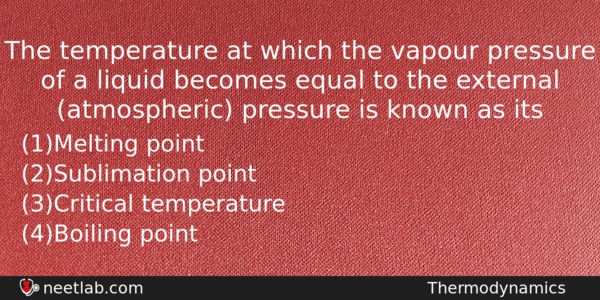| ⇦ | 
| ⇨ |
The temperature at which the vapour pressure of a liquid becomes equal to the external (atmospheric) pressure is known as its
Options
(a) Melting point
(b) Sublimation point
(c) Critical temperature
(d) Boiling point
Correct Answer:
Boiling point
Explanation:
Boiling point is the temperature at which the vapour pressure of a liquid becomes equal to the external (atomospheric) pressure.
Related Questions: - Angle of contact of a liquid with a solid depends on
- IF A⃗ and B⃗ are two vectors and θ is the angle between them
- Heat is supplied at constant pressure to diatomic gas. The part of this heat that goes
- The de-Broglie wavelength of an electron is the same as that of a 50 KeV X-ray photon.
- A bottle full of water in a space ship at 30⁰C is carried on the moon.
Topics: Thermodynamics
(179)
Subject: Physics
(2479)
Important MCQs Based on Medical Entrance Examinations To Improve Your NEET Score
- Angle of contact of a liquid with a solid depends on
- IF A⃗ and B⃗ are two vectors and θ is the angle between them
- Heat is supplied at constant pressure to diatomic gas. The part of this heat that goes
- The de-Broglie wavelength of an electron is the same as that of a 50 KeV X-ray photon.
- A bottle full of water in a space ship at 30⁰C is carried on the moon.
Topics: Thermodynamics (179)
Subject: Physics (2479)
Important MCQs Based on Medical Entrance Examinations To Improve Your NEET Score
18000+ students are using NEETLab to improve their score. What about you?
Solve Previous Year MCQs, Mock Tests, Topicwise Practice Tests, Identify Weak Topics, Formula Flash cards and much more is available in NEETLab Android App to improve your NEET score.
Share this page with your friends

Leave a Reply